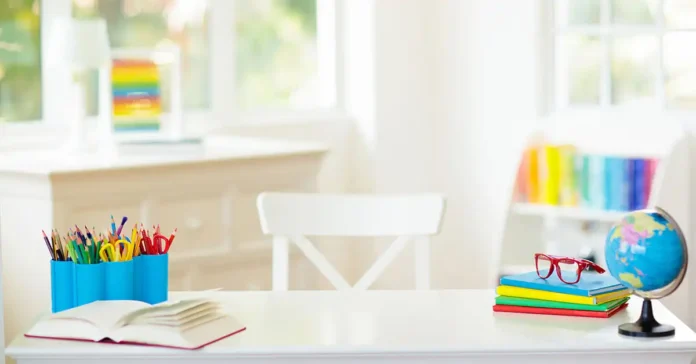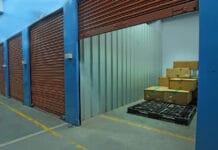Maintaining an organized living space is essential for productivity and peace of mind. One area often overlooked yet crucial for a clutter-free environment is your study table. Whether you’re a student or a professional working from home, study table cleaning can significantly enhance your efficiency and focus. Imagine a study table devoid of unnecessary items, where every book, pen, and paper has its designated place.
Start by assessing what items are essential for your daily study or work routine and what can be stored elsewhere. Consider using luggage storage solutions for items you don’t need immediate access to but want to keep. This can free up valuable space on your study table and create a more streamlined setup. Let’s explore a range of tips and tricks specifically tailored to study table cleaning and organization.
Study Table Cleaning – An Overview
Relocation or downsizing your study materials can also play a significant role in optimizing your study table. If you have books or documents that you rarely use, consider relocating them to a storage area or downsizing your collection to include only the most relevant and frequently accessed materials. From efficient storage solutions to decluttering strategies and insights into downsizing effectively, you’ll learn how to transform your study table into a functional, inspiring workspace that promotes organized living.
1. Start at the Desk
The best way to begin the cleaning process is to remove everything that is a part of the clutter before organising. Remove everything from the drawers and the tabletop to thoroughly clean the table. Use a dry cloth to remove dust and a wet cloth to remove stains. A dust-free study table will keep you safe from harmful bacteria that can harm your health and cause disruptions in your study schedule.
If you have a tablecloth, make sure it is frequently washed and changed. Even if you are studying for exams through online platforms, it always helps to make sure your study table is neat and tidy. Once you have cleaned up your table, it is time to move on to the drawers and shelves.
2. Put items in drawers
All items that are not part of your daily study schedule should be kept in drawers. Define a proper space for each item so that you can easily find them when needed. Make sure you have one drawer for each type of item. If your table does not come with many drawers, consider making a desk organizer. Store all electronic items, such as a scientific calculator, tablet, SD card, and USB drive, in one drawer for easy access.
3. Drawers for Your Subject Books
Do not pile too much on the table. That does not mean you should not have a place to store your belongings though.
Make the most of the space available if you have a large study table with a lot of drawers. Keep one drawer for each subject instead of keeping all the books on the table. Label the drawer from the top to easily find the correct drawer when looking for study materials.
If you do not have extra drawers or shelves, several types of hanging closet organisers are available today for your different projects. They are widely available, and they can be chosen based on space availability and convenience. You can even look for desktop file organisers on Amazon, which can help in keeping your desk neat and tidy. They are simple to assemble and disassemble and are ideal for organising your files, documents, books, and other items. By doing so, you can easily keep visible clutter off the study table, stay organised and most importantly avoid your mother’s regular scolding sessions!
4. Keep a Dustbin Nearby
If you have a habit of scribbling or revising while writing, keep a dustbin nearby to toss all the rejected paper balls into. To save space you can keep the dustbin under your desk and clean it out every alternate day. If you have the habit of recycling, then it is ideal to arrange separate bins or old boxes that can be used for paper waste and other waste. This will not only help keep the table clean, but it will also keep the litter off the floor of your room. However, to avoid trash overflow, make it a habit to clean the trash can once a week.
5. Store Your Stationery in holders
Do you keep misplacing your pens, pencils, and markers? If you do not have a pen holder on your study table, all your stationary items roll down from the table and end up under the bed! Bring home a pen holder and securely store all your belongings in it to avoid losing them. You can even store erasers, paper clips, and other small items in the same holder. If you have paper pins, however, keep them in a separate box to avoid accidents.
Final Words on Study Table Cleaning
Maintaining a clean and organized study table not only enhances your productivity but also provides stress-free living environment. With the help of these tips and tricks, you can create a space that inspires focus and creativity. Utilizing storage solutions like bins, shelves, or drawers for items not frequently used on your study table can free up space and reduce clutter. Decluttering regularly is another essential practice, as it prevents unnecessary accumulation of items that can distract or overwhelm.
At the end of the day, your study table should be empty but not cold and uninviting. You can add a desk lamp or photographs or a clipboard for motivational quotes or add a small indoor plant if that fits your style. Remember, a well-organized study table can motivate you to study more while also saving you time. To increase productivity, keep your study table neat, clean, and organised always!
FAQs for Study Table Cleaning
A1: Ideally, you should clean your study table at least twice a week to keep it free from dust and clutter.
A2: You can use a microfiber cloth, mild detergent or cleaning spray, water, and a soft brush for proper cleaning.
A3: For stubborn stains, mix a mild detergent with water, apply it to the stain, and gently scrub with a soft brush or cloth
A4: It’s best to avoid harsh chemicals as they can damage the surface of your study table. Always use gentle cleaning agents.
A5: Use coasters for hot or cold items, avoid dragging sharp objects, and consider using a desk pad or mat for added protection.
A6: You can use trays, organizers, or drawers to keep papers and stationery organized and within reach without cluttering the tabletop.
A7: Yes, polishing your wooden study table every few months can help maintain its shine and protect it from moisture.
A8: Use a soft, dry cloth to wipe the screens and surfaces of electronic devices regularly to remove dust and mars.
A9: Yes, you can use a damp cloth with water or a mild cleaning solution to clean a study table with a laminate finish.
A10: Regularly declutter, clean spills immediately, and follow proper cleaning techniques to ensure your study table stays clean and organized over time.








